- Home
- Edward Cline
The Sparrowhawk Companion Page 7
The Sparrowhawk Companion Read online
Page 7
Kenrick, Effney Baroness of Danvers, mother of Hugh—Books 2-6
Kenrick, Garnet Baron of Danvers, father of Hugh, brother of Basil—Books 2-6
Kenrick, Guy 14th Earl of Danvers—Books 2-4
Kenrick, Hugh Son of Garnet—Books 2-6
Kenrick, Sir Bowler Ancestor—Book 2
Kenrick, Sir Stanier Ancestor—Book 2
Knowlton, Samuel Captain, Connecticut militia—Book 6
Lapworth, Mr. Kidnapper—Book 1
Leggate, John Actor/prop master—Book 1
LeGrand, Winslow Dogmael Jones’s secretary—Book 5
Leigh, Major Adam Middlesex Brigade—Book 1
Leith, Isham Innkeeper, murderer—Book 1
Lennox, Charles 3rd Duke of Richmond—Book 4
Levesque, Paul Brother of Madeline McRae—Book 3
Lumley, Ideona Play character—Book 1
Manners, William Lieutenant, Captain Tallmadge’s aide—Book 6
Marrable, Baron Guest at Pumphrett concert—Book 2
Marriott, James King’s advocate, pamphleteer—Book 5
Marsh, Romney A.K.A. Redmagne, as author of Hyperborea—Books 2-
3 Massie, Capt. John Planter, Morland Hall—Book 3
Maupin, Gabriel Silversmith, cabinet maker—Books 3-5
McDougal, Alex Scottish trader—Book 2
McDougal, Duncan Father of Alex—Book 2
McLeod & McDougal Scottish trading partnership —Book 3
McLeod, James Partner of McDougal—Book 2
McRae, Etáin Daughter of Ian—All Books
McRae, Ian Father of Etáin, Scottish factor—Book 3
McRae, Madeline Mother of Etáin—Books 1-3
Mendoza, Jacob Pippin: Abraham/Alcyone—Book 2
Mercer, George Burgess for Frederick, stamp distributor—Book 5
Meredith, William MP for Liverpool—Books 4-5
Meservy, Robert Pippin: Tobius/Tayete—Book 2
Milgram House Dorset, Kenrick residence—Books 2-3
Moffet, Dorothy Wife of James, Morland Hall—Books 3-4
Moffet, James Tenant, Morland Hall—Books 3-4
Molyneux, Thomas MP for Haslemere —Book 5
Montagu, John 4th Earl of Sandwich —Book 5
Morley, Millicent Redmagne’s mistress, Etáin’s governess—Book 1
Mouse Cooper, slave, Morland Hall—Book 3
Munford, Robert Burgess, Mecklenburg, General Assembly—Book 4
Murray, John Earl Dunmore, Governor of Virginia—Book 6
Murray, William Baron Mansfield, Chief Justice, King’s Bench—Books 4-5
Musto, Charles Captain, Charon—Book 2
Nameless MP for Bristol—Book 2
Nameless MP for Craddock—Book 2
Nameless MP for Norwich—Book 2
Nameless MP for Nottingham—Book 2
Nameless MP for Oxford—Book 2
Nameless Junior Attorney-General—Book 2
Nameless Junior Solicitor-General—Book 2
Nameless Vicar of St. Brea’s, Gwynnford—Book 1
Nameless Sergeant, Sea Siren Tavern—Book 1
Nault, Henry Warehouseman, Caxton—Book 5
Neaves, Mrs. Wife of Spencer—Book 1
Neaves, Spencer Merchant—Book 1
Nicholas, Robert C. Burgess, York City, General Assembly—Books 4-6
Norris, Mr. Easley’s clerk—Book 3
North, Frederick “Lord” MP for Banbury—Books 4-5
Nugent, Robert MP for Bristol—Book 4
O’Such, Rory A.K.A. Redmagne—Book 1
Ockhyser, John Overseer, Meum Hall—Book 3
Olland, Will Bosun, Rainbow Warship—Book 5
Onslow, Arthur MP for Surrey, Speaker for Commons—Book 2
Ornsby, Lady Guest at Pumphrett House—Book 2
Otway, Henry Planter, Caxton—Books 3-4
Otway, Maura Wife of Henry—Books 3-4
Otway, Morris Son of Henry—Books 3-5
Oyston, Mr. Kidnapper—Book 1
Paine, Thomas Excise man, Lincolnshire—Book 4
Pannell, Sir Henoch MP for Canovan, Revenue man—Books 1-6
Parmley, Robert Pastor, Trelow—Book 1
Parrot, Sir James King’s Counsel, King’s Bench, Pippin Trial—Books 3-5
Passmore, George Tenant, Morland Hall—Books 3-4
Pendleton, Edmund Burgess, Caroline County, General Assembly—Book 4
Petty, Agnes Daughter of Mabel—Book 2
Petty, Mabel Owner, Fruit Wench tavern, London—Book 2
Pitt, George MP for Dorset—Book 5
Pitt, William MP for Bath—Book 5
Plume, Chester Skelly Gang—Book 1
Pompey Slave, Meum Hall—Books 3-6
Pratt, Charles Baron Camden, Chief Justice, Common Pleas—Book 5
Preeble, Mr. Constable, Gwynnford—Book 1
Prescott, Col. Wm. Massachusetts, Breed’s Hill—Book 6
Primus Slave/Overseer, Meum Hall—Book 3-4
Proudlocks, John Tenant, Oneidan Indian, Morland Hall—Book 3-6
Pumphrett, Warren Brother of Chloe—Books 1-2
Pumphrett-Pannell (Chloe) Wife of Henoch—Books 2-4
Pursehouse, James Kenrick banking partner—Book 3
Putnam, Israel Brig. General, Massachusetts—Book 6
Rachel, Miss Servant girl, Talbot household—Book 3
Ragsdale, Eyre Major, commander of 6th Marine Battalion—Book 6
Ramsey, Michael Ensign, Battle of Minden—Book 3
Ramshaw, John Captain, Sparrowhawk—Books 1-5
Randolph, John Chief Clerk, General Assembly—Book 4
Randolph, Peter Governor’s Council—General Assembly—Book 4
Randolph, Peyton Attorney-General, Burgess, Williamsburg (brother of Peter and John, General Assembly)—Books 4-6
Redmagne (Methuselah) A.K.A. Rory O’Such, et al.—Book 1
Reisdale, Thomas Lawyer, Caxton—Books 3-5
Requardt, George Captain, the Busy—Book 5
Rickerby, Nathan Solicitor/landlord—Book 2
Rittles, Louise Innkeeper, wife of Lucas—Book 3-4
Rittles, Lucas Grocer, husband of Louise—Book 3-4
Rittles, Mr. Hugh’s tutor—Book 2
Roane, George Under-sheriff, Caxton—Book 3-4
Robichaux, Paul Captain, French privateer—Book 1
Robins, Obedience Business agent, Morland Hall—Books 3-6
Robinson, John Speaker, Burgess, King & Queen—Books 4-6
Robinson, William Rev., Commissary of Virginia—Book 4
Rowland, Thomas Captain, The Busy—Books 2-4
Rudge, Mr. Gwynnford merchant—Book 1
Runcorn, Owen Hugh’s valet—Books 2-3
Russell, John 4th Duke of Bedford—Book 4
Sackville, Charles MP for East Grimstead—Book 4
Sackville, George MP for Hythe—Book 4
Safford, Steven Proprietor, King’s Arms Tavern, Caxton—Books 3-6
Sarah Slave, Meum Hall—Book 3
Sargent, John MP for West Looe—Book 5
Selwyn, James Captain, 6th Marine Battalion—Book 6
Settle, William Overlooker, Meum Hall—Book 3
Seymour, Henry MP for Totnes—Book 5
Shakelady, Aubrey Skelly Gang—Book 1
Shearl, Joseph Carpenter, Meum Hall—Book 3
Shrubb, Richard London alderman—Book 2
Skeats, Jubel Sheriff, Gwynnford—Book 1
Skelly, Osbert Augustus Magnus, gang leader, smuggler—Book 1
Smith, Champion Slave—Book 3
Smith, John A.K.A. Redmagne, original name—Book 1
Spears, Radulphus Hugh’s valet, Meum Hall—Books 3-6
Spranger, Mr. Philadelphia merchant—Book 2
Stanhope, Philip D. 4th Earl of Chesterfield—Books 4-5
Stanley, Hans MP for Southampton Borough—Book 5
Stannard, Arthur British tobacco agent, Caxton—Books 3-5
Stannard, Joseph Son of Ar
thur—Books 3-6
Stannard, Winifred Wife of Arthur—Books 3-6
Stark, Col. John New Hampshire regiments, Breed’s Hill—Book 6
Sterling, Walter Capt., Rainbow, Hampton Roads—Book 5
Stobb, Mr. Constable, Danvers—Book 2
Stodwell, Mr. Bookseller—Book 2
Sutherland & Bain Scottish tobacco importers, McRae’s firm—Books 3-6
Swain, Glorious Pippin: Muir/Maia—Book 2
Swart, Amos Planter, Brougham Hall—Book 3
Swart, Felise Wife of Amos—Book 3
Sweeney, Daniel Pippin: Claude/Celaeno—Book 2
Swire, John Kenrick banking partner—Book 2
Talbot & Spicer Merchants, Philadelphia—Books 2-4
Talbot, Otis Merchant, Kenrick colonial agent—Books 2-5
Taller & Wyshe Printers, London—Book 2
Tallmadge, Drew Father of Roger—Books 2-3
Tallmadge, Francis Brother of Roger—Book 2
Tallmadge, Roger Hugh’s friend, officer, MP for Bromhead—Books 2-6
Threap, Caleb Tenant, Morland Hall—Books 3-4
Tippet, Cabal Sheriff, Caxton—Books 2-6
Tippet, Muriel Wife of Cabal—Books 3-6
Topham, Moses Carpenter, Morland Hall—Books 2-6
Townshend, Charles MP for Harwich, Board of Trade—Books 4-5
Townshend, Thomas MP for Whitchurch—Book 4
Tragle, Buell Master of seized Sparrowhawk—Book 6
Trantham, Drury Hero of Hyperborea—All Books
Treverlyn, Fulke Prosecutor, Falmouth trial, MP for Old Boothby—Books 1-5
Trigg, John A.K.A. Redmagne/“London” alias—Book 1
Trist, Toby Play character—Book 1
Trott, Agnes Daughter of Hiram—Book 1
Trott, Hiram Owner, Sea Siren tavern—Book 1
Trott, Jim Son of Hiram—Book 1
Tuck, Elmo Cook, Skelly Gang—Book 1
Tucker, John Kenricks’ coachman—Book 2
Turley, Jared Bastard son of Earl (aka “Mr. Hunt”)—Books 4-6
Twycross, Hugo Justice—presiding judge, Falmouth trial—Book 1
Vere, Ann Housekeeper, Meum Hall—Books 3-6
Vishonn, Annyce Daughter of Reece, marries Morris Otway—Books 3-4
Vishonn, Barbara Wife of Reece—Books 3-6
Vishonn, James Son of Reece—Books 3-6
Vishonn, Reece Planter, Caxton—Books 3-6
Walthoe, Nathaniel Clerk of the Virginia Council—Book 5
Ward, Artemas Commander, Breed’s (Bunker) Hill—Book 6
Warren, Dr. Joseph Massachusetts patriot—Book 6
Washington, George Burgess, Frederick, General Assembly—Book 4
Weddle, Umphlett & Co. London tobacco importers, Stannard’s firm—Book 2
Westcott, Emery Portrait painter—Books 2-4
Whately, Thomas MP for Ludgershall, Grenville’s secretary—Books 4-5
Wicker, James Justice, Falmouth—Book 1
Wilbourne, Andrew Viscount—Book 2
Wilkes, John MP for Aylesbury—Books 4, 6
Wolfe, James Lt. Colonel—Book 2
Worley, Benjamin Proprietor, Worley & Sons—Books 2-6
Worley, Joseph Son of Benjamin—Book 2
Worley, Lemuel Son of Benjamin—Book 2
Worley, Mrs. Wife of Benjamin—Book 2
Wynne, Rev. Vicar of St. Quarrell’s, Danvers—Book 2
Wythe, George Burgess, Elizabeth City—Books 4-6
Zimmerman, Isaac Tenant, Morland Hall—Books 3-6
Zouch, Henry Brickmaster, Meum Hall—Books 3-6
MEUM HALL STAFF:
Business Agent: Rupert Beecroft
Overlooker: William Settle
Overseer: John Ockhyser
Housekeeper: Ann Vere
Cook: Fiona Chance
Servant/Valet: Radulphus Spears
Carpenter: Joseph Shearl
Brickmaster Henry Zouch
Slaves: Bristol, Champion Smith, Cypriot,
Cupid, Benabe, Jem, Bilico, Primus, Pompey
Female: Sarah, Dilch, Diana, Rachel, Delia, Malkin
MORLAND STAFF:
Business Agent: Obedience Robins
Overlooker: William Hurry
Housekeeper: Susannah Giddens
Cook: Mary Beck
Servant: Ruth Dakin
Carpenter: Moses Topham
Coopers: Mouse, Henry Dakin
Brickmaker: Aymer Crompton
Tenants: George Passmore, Isaac Zimmerman,
James & Dorothy Moffet, Caleb Threap,
Timothy Bigelow, John Proudlocks
* * *
SHIP NAME TYPE
Amelia Merchantman, sloop
Amherst Merchant sloop, formerly the Nancy
Antares Merchantman
Ariadne Merchantman, schooner, the Kenricks’ own vessel
Atlantic Conveyor Merchantman
Basilisk Customs sloop-of-war, 8 guns, 8 swivels, Turley’s ship (formerly the Nassau)
Belfast Merchant sloop
Busy Merchantman, Worley & Sons, American trade
Charon Merchantman
Cronus East Indiaman
Diligence Sloop-of-war, Chesapeake Bay, 12 guns, 12 swivels, 100 crew
Dolphin Merchantman
Dorothea Slave ship
Durand French privateer
Excelsior Merchant schooner
Friendly Merchantman
Fowey Frigate, 6th rate, 24 guns, 160 crew, sunk by shore batteries at Yorktown, 10/10/81
Galvin Merchantman
George’s Pleasure Merchantman, sloop
Greyhound Drury Trantham’s ship (in Hyperborea)
Hare Frigate (nicknamed the Tortoise)
Hasty Hart Merchantman, Skelly’s smuggling vessel
Helios Warship, frigate, convoy
Jason Warship, frigate, convoy
La Fleu French privateer “The Scourge”
La Voleur French privateer “The Thief”
Magdalen Schooner (Royal Navy)
Manx Slave ship, Royal African Company
Mercury Frigate, 20 guns
Morag Merchant schooner (Scottish)
Nassau Seized by Hunt, renamed Basilisk (Turley’s raider )
Nimble Merchantman, Worley & Sons, European trade
Osprey Merchantman
Otter Warship
Pegasus Merchantman, Skelly’s—pre-outlaw years
Pericles Merchantman
Peregrine Merchantman
Prudence Merchant brig owned by Novus Easley
Rainbow Warship, 5th-rate frigate, Chesapeake Bay, 44 guns, 280 crew
Regale East Indiaman
Regulas Merchantman
Roilance Merchantman
Rose Warship, frigate
Rover Warship, frigate
Skate Merchant sloop
Sparrowhawk Merchantman, Ramshaw’s (later Geary’s, then Hunt’s)
Swiftsure Merchantman, sloop
Tacitus Merchantman, brig
Thunderer Warship, line
William/Dunmore Merchantman, seized by Dunmore for quarters
Zeus Warship, frigate, convoy
* * *
THE POLITICAL
SPEECHES OF SPARROWHAWK
Compiled by Edward Cline
A key element in the character of the Sparrowhawk series—perhaps even of its appeal to readers—is its political speeches. The principal ones are included here, spoken in Parliament and the Virginia House of Burgesses by Henoch Pannell, Colonel Isaac Barré, Dogmael Jones, Hugh Kenrick, Patrick Henry, and William Pitt. Two of these speeches are actual speeches, one by Barré, the other by Pitt. The others, including Patrick Henry’s Stamp Act Resolves speech, I wrote myself. Henry’s was composed around the fragments of that unrecorded speech remembered by men years later. Barré is important because he was one of the few British parliamentarians who understood the American colonists; he warned his fellow legislators not to take the colonis
ts or their loyalty to the mother country for granted; his warning fell on deaf ears. Pitt is important because, while he sided with the Americans, he inadvertently handed Parliament and its career depredators an excuse to continue to pursue policies intended to reduce Americans to servitude.
The best eighteenth–century political speakers, in the colonies and in Britain, were trained in oratory and rhetoric. They could deliver hours-long speeches without so much as a note, and make sense. Even the villains of the time were adept in oratory, and it took a keen mind to see through their sophistry. While I composed sermons, doggerels, the occasional newspaper article, and even sketched two political cartoons for the series, I derived special pleasure in writing the speeches. Early on I realized that if one were going to recreate the British-American culture and politics of the period, political speeches must form an integral part of the epic. If men were moved passionately by the ideas of freedom—or dead set against them—how better to dramatize the passion and the opposition than by showing what was thought and said?
To read these extemporaneous speeches, one cannot help but note an essential difference between them and what passes for oratory today. Most modern politicians cannot speak two complete sentences together from memory without the aid of a written text, extensive notes, or a teleprompter. Most of them do not—in fact, cannot—write their own speeches, but rely on hired speechwriters, whose efforts doubtless are endlessly rewritten to conform to what a speaker wishes his auditors to believe he is saying or what he thinks they wish to hear. Further, their speeches are largely ragouts of “messages”; that is, of unappetizing stews of refried bromides, lubricious principles, and populist claptrap, all calculated to appeal to men’s emotions, not to their minds. Modern speechmaking is a monument to vapidity. I cannot recall the last time I heard a living American politician declaim on individual rights, freedom of speech, or the sanctity of private property.
So, it was with great relief and pleasure that I could retreat to a time when these matters were a common subject of speechmaking.
* * *
Sir Henoch Pannell, member for Canovan, and dedicated enemy of the
American colonies, gives his maiden speech in Parliament, 1755.
“It has been heard in this assembly on a number of occasions that the colonials are unhappy with the means with which this coming war is to be paid for and prosecuted. Oh, how they grumble, those rustical Harries! The means, as we all know, and as they rightly fear, must in the end come out of their own rough, bucolic purses. To my mind, that is but a logical expectation. Yet, you would think, to judge by some of the protestations that have reached our ears, that the Crown was proposing to engage the French over Madagascar for possession of that pirates’ nest, and obliging them to pay the costs of an adventure far removed from their concerns. But—the threat is to their own lives, their own homes and families, their fields, their shops, their seaports, their own livelihoods, and they higgle and haggle over the burden of expense! A very strange state of mind, indeed! I am merely a messenger, sirs. Do not entertain thoughts of murdering me for what I have said, or am about to say.

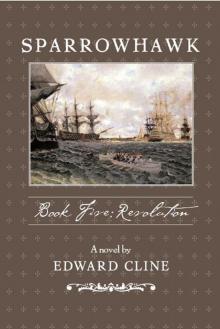 Revolution
Revolution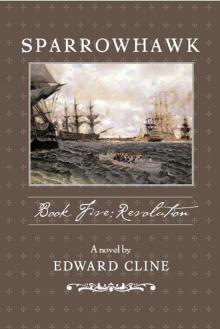 SH05_Revolution
SH05_Revolution War
War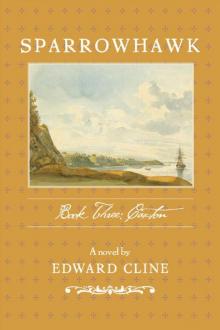 SH03_Sparrowhawk: Caxton
SH03_Sparrowhawk: Caxton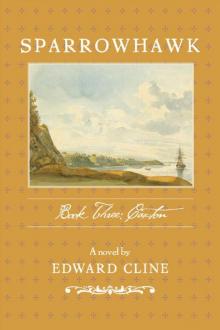 Sparrowhawk III
Sparrowhawk III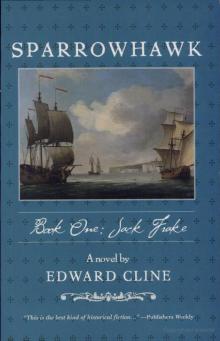 Jack Frake
Jack Frake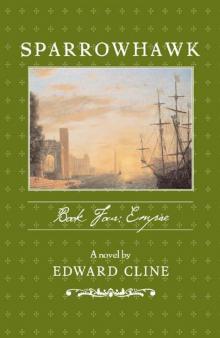 SH04_Empire
SH04_Empire Empire
Empire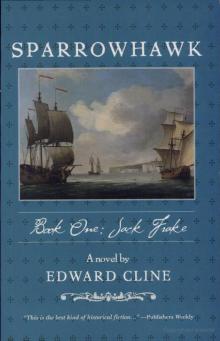 SH01_Jack Frake
SH01_Jack Frake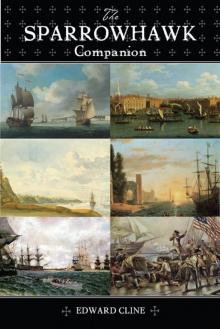 The Sparrowhawk Companion
The Sparrowhawk Companion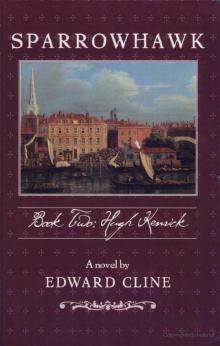 Hugh Kenrick
Hugh Kenrick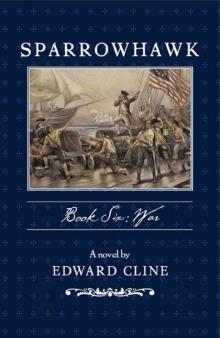 SH06_War
SH06_War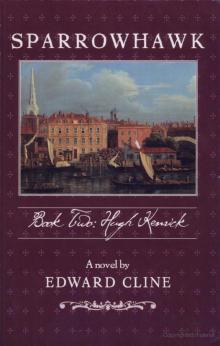 SH02_Hugh Kenrick
SH02_Hugh Kenrick